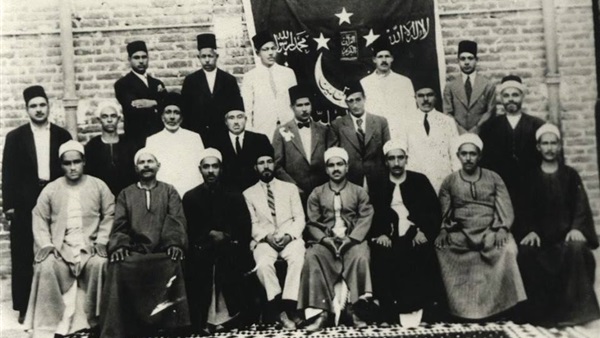Ahmed the Barber, One of the MB Founders

In Ismailiya, a town in the Egyptian Suez Canal zone, in March 1928, six of those who frequented Hassan el-Banna's residence to listen to his tutorials, deeply appreciated what el-Banna taught them and decided to collaborate with him, pledging to listen and obey.
Those
were the men called in the MB literature' the six pledgers' or 'the first
cell', in the history of the group. Those were: Hafiz Abdul Hamid, a carpenter
in the European Quarter, Ahmed el-Masry, a barber in el-Jami street, Fouad
Ibrahim, a presser in the European quarter, Abdul Rahman Hassaballah, a driver
in the Canal Corporation, Ismail Ezz, a gardener in the Canal Corporation and
Zaki el-Moghrabi, a bikes salesman, in el –Souk street.
In the
one book that he ever authored,' Mudhakkirāt al-Daʿwah wa’l-Dāʿiya'(Memoirs of the Call and the Preacher), Hassan
el-Banna gives an account of the first meeting that witnessed the initiation of
the MB (Muslim Brotherhood), saying :'They talked to me without a stammer,
their eyes shining and their faces glowing with the fire of faith and
determination. They said: 'We have listened ; we have understood ; we are
impressed.
We do not
know what to do, in order to give Islam back the greatness it used to have and
to Muslims the welfare that they deserve. We are sick of this life, the life of
humility and bondage. You can see for yourself that Arabs and Muslims in this
country have no prestige, no dignity.
They are no more than wage earners drudging under
these foreigners. We have nothing except hot blood boiling in our veins,
pumping the love of freedom to our hearts and minds. We have nothing but our
spirits shining with faith and dignity. In addition to all this, we only have
this pittance, taken from modest family budgets.'
They
added, el-Banna says : 'We cannot know, as much as you know, what is to be done
or what is the best way to serve the homeland, the faith and the Ummah. All we
want to do, now, is to give you all that we can give, so that we may be
relieved of every responsibility when we stand before the Lord on the day of
Judgment.
You will
be responsible to Him, for us and for our deeds. A group pledging to god, in
all sincerity, to live for His Word and to die for His Cause, seeking nothing
but the Grace of God, is a group worthy of victory, no matter how small the
team and how flubbed the equipment.'
He goes
on to say: 'I was touched by those honest words. It was impossible for me to
evade the responsibility they burdened me with, especially as this is what I am
calling for, what I am trying to get people to adhere to.
So, I
told them, as I was deeply impressed: May God reward you for this. May He bless
your good intentions. May he guide us to good deeds that are acceptable to him
and are beneficial to people. All we have to do is work hard and leave it to
Him to decide the results of our work.
Let is pledge
to God, that we will be soldiers for the call of Islam, the call that maintains
the life of the homeland and the glory of the Ummah.' This was the pledge. And
then he says: 'It was an oath we took, to live as brothers, working for Islam
and struggling for its cause.'
El-Masry,
who was eighteen at the time of the pledge, comes from Port-Said, to which he
returned at the end of his stay in Ismailiya, to set up an MB cell, with the
aim of dessiminating the teaching of el-Banna. This paved the way for el-Banna
to come and deliver a speech in a conference organized by Muslim Brethren in
Port-Said and presided over by el –Masry.
El-Masry
participated in the establishment of a branch for the Nizam Khas (Special
Organization; the Arabic name being a translation of the name of the Ottoman
secret organization Teşkilât-ı Mahsusa). In his book 'The Truth about the
Special Organization', prominent Muslim Brotherhood member, Mahmoud el-Sabbagh
says : I was not a stranger to Port-Said, as I worked in that town as a head of
its observatory in 1944. I was commissioned by the Supreme Guide to set up
sub-groups of the Special Organization.
I was
given a letter to this effect, by the supreme Guide, addressed to Brother Ahmed
el-Masry, the leader of the Port-Said Brethren, who was asked to make it esy
for me to get the job done. He was told to tear the letter to pieces, after
having read it. It was then, in 1944, that the Special Organization sub-groups
in Port-Said were formed, under my leadership'
El-Masry
escorted el-Banna, during a visit to Palestine. Later on, he was arrested and
taken to prison for a year. After being released from prison,he took part in
the skirmishes against British forces in the Canal Zone.
Following
instructions from the second Supreme Guide Hassan el-Hudaibi, el-Masry
collaborated with the July 23, 1952 Revolution, when all was well between MB
and the Revolution. In 1954 he was among those arrested for their participation
in the attempt on President (Prime Minister, at the time) Nasser's life,
sentenced to 10 years in prison.
At the end of that term, he was arrested, yet
again, in 1965, to be released in 1971, when Anwar Sadat became president. Once
released from prison, he left the country and died abroad, in October 2005.





